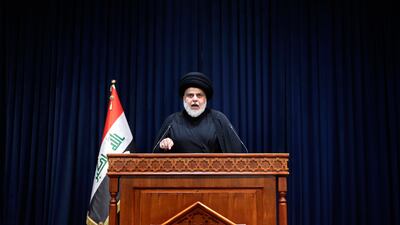Early elections will not solve Iraq's political deadlock and may drag the country further into crisis, experts told The National on Wednesday.
For months, powerful Shiite cleric Moqtada Al Sadr has been calling for re-elections and the dissolution of Parliament. This comes after his political party won last October's polls but fell short of a majority.
The country has been without a newly elected government for 11 months.
“Holding new elections may be a way to reset the deadlock but we may end up in another deadlock,” Sajad Jiyad, an Iraqi political analyst based in Baghdad and a fellow at Century International, said.
Calls are being made for re-elections as deals are not being struck between political parties and there is not an alternative for a way out of the impasse, he added.
Mr Al Sadr and his followers, who call themselves the Sadrists, have staged protests across the country against their rival group the Shiite Co-ordination Framework.
Tensions heightened drastically last week after the cleric's followers stormed Baghdad's Fortified Green Zone. The move killed at least 30 people, mostly Mr Al Sader's supporters, following clashes with armed groups after he announced he was quitting politics.
At least 400 people were wounded in the violence.
Normal life has returned to Baghdad after a bloody week, but the political stand-off remains.
Mr Al Sadr was frustrated in his attempts to form a government after the general election, despite his bloc winning the largest number of seats.
His rivals in the Iran-aligned Co-ordination Framework alliance have insisted a government should be formed and there is no need for another vote.
“Elections are not the solution and they may lead to the situation becoming even more serious and people losing all trust in democracy and the election process,” Mr Jiyad told The National.
Mr Al Sadr has been calling for early elections, which is a critical demand for him and his supporters who have called for the dissolution of Parliament.
Meanwhile, the Co-ordination Framework want a new head of government appointed before new polls are held.
Results might “be more of the same because of turnouts, we expect turnout to be low again, maybe the Sadrists will come out on top and the framework will do a bit better, but we expect the results to be the same,” Mr Jiyad said.
Low voter turnout
The turnout was 43 per cent in last October's election, but the results were lower than the last election in 2018.
The country's electoral commission said more than 9.6 million people voted in the October 10 vote.
"It is difficult to see whether we can expect different results because what we know is that most Iraqis are not voting and in every election the voter turnout has been lower and lower," Renad Mansour, an Iraq scholar at the Chatham House think tank in London, told The National.
"What that means is those coming to voting age are less likely to vote so the only people who are voting are those linked to the social base of political parties."
October's vote involved at least 167 parties and more than 3,200 candidates competing for 329 seats in Parliament.
It is only the Sadrists that are calling for fresh elections and, based on Chatham House's research, Mr Al Sadr has a strong base that is willing to go out and vote.
"The question is have they [Sadrists] learnt that if they can get more votes, that they can actually pursue a majority government in a way that they couldn’t compared to last year’s elections?" Mr Mansour said.
"This is what they are planning for, to have another early election and they will be in a better position, their people have learnt that voting does matter," he said.
Mr Mansour said that it was hard to "see a very big difference" if Iraq was to hold another election.
"The Sadrists are hoping they can re-emerge with stronger political capital," he said.


